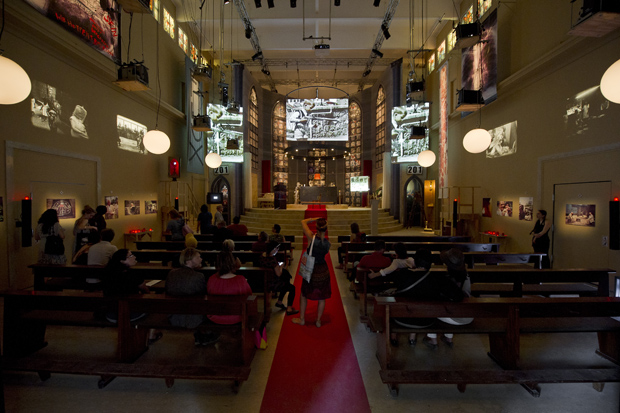Christoph Schlingensief in conversation with Alexander Kluge (Extract of an interview, November 2007) © Alexander Kluge/ dctp
Christoph Schlingensief in conversation with Alexander Kluge (Extract of an interview, November 2007) © Alexander Kluge/ dctp
I first met Christoph Schlingensief in 1987, when he cast me for his film Schafe in Wales
[Sheep in Wales]. He was still fairly unknown at the time, and at first glance he struck me
as a good-looking young middle-class man who had manners; every mother-in-law’s perfect dream. Yet behind the bourgeois façade lurked a great seducer, who would use his overwhelming charm to drive me into the craziest acts of self-abandonment, something I had not experienced since my time with Rainer Werner Fassbinder. After Fassbinder, with whom I spent a formative chapter of my life, from 1966 until his death in June 1981, and to whom I owe my very personal “Éducation sentimentale” in matters artistic as well as personal, working with Christoph now cast a similarly fascinating spell over me that mixed pleasure, fear, and curiosity. more…
Jewish tombs in the twelfth century bear an emblem: a hare. In 1943, the symbol on the stones attracted the attention of Oberrottenführer Hartmut Mielke when his convoy was bulldozing Jewish cemeteries in central Germany so that the sites could be used for the construction of water tanks for fire trucks. The motif returns on tombstones from the seventeenth century: outstretched, prone hares “sleeping” or “slain.”
The Oberrottenführer, who was a dedicated local historian in his spare time, knew that this use contrasted with pagan depictions of hares in Celtic areas south of the Rhön Mountains, where hares are documented as appearing on sacrificial stone altars, but not on tombs. more…

A Church of Fear vs. the Alien Within. Stage installation of the Fluxus-oratorio by Christoph Schlingensief in the German Pavilion, Altar view with film projection
Photo: (c) Roman Mensing, artdoc.de
Audio: Funeral
Terror 2000 (Intensive Station Germany), Germany, 1991-92, Directed by Christoph Schlingensief © Filmgalerie 451
Audio: At Table
100 Years Adolf Hitler (The Last Hour in the Fuhrerbunker), Germany, 1988-89, Directed by Christoph Schlingensief © Filmgalerie 451
Audio: The birth of Peter Panne
United Trash, Germany 1995-6, directed by Christoph Schlingensief © Filmgalerie 451
Audio: Theme Music (Helge Schneider)
Menu Total, Germany, 1985-86, Directed by Christoph Schlingensief © Filmgalerie 451
Audio: Border Control
The German Chainsaw Massacre (The First Hour of German Reunification), Germany, 1990, Directed by Christoph Schlingensief © Filmgalerie 451
Sunday, August 22, 2010, eight o’clock. Stunned by the news of your death that came yesterday—in the end, it was a surprise after all—and having slept only a few hours, I gaze into the morning sun, little big Scorpio brother, and find no way forward in my gloom. As though paralyzed, my mind keeps returning to something Bazon Brock made us take to heart: Death must be abolished, this damn mess must stop. Your fiftieth birthday was to be in a few weeks, the opera village project in Africa needed ongoing work, and of course you had hoped to make a personal appearance in Venice next year, where you were to design the German biennial pavilion. It would have been an honor for you to represent the nation and to irritate it as well, to challenge and provoke. more…
The interdisciplinary Symposium Der Gesamtkünstler Christoph Schlingensief organized by the Elfriede-Jelinek-Research Centre in cooperation with the Kunsthalle Wien and the Thyssen-Bomemisza Art Contemporary will be held from 6th – 10th April 2011.
The symposium will include discussions about Schlingensief’s artistic and theatrical aesthetics, the form of his works, the networking of Arts and the resulting media compaction and collisions.
For further information about the program and venue, please visit the website https://www.elfriede-jelinek-forschungszentrum.com/veranstaltungen/schlingensief-symposium-2011/.
By 1984 I had grown tired of meeting market deadlines in my writing about movies. No launching date? No text! So it was welcome news that the people at Hamburg’s Abaton theater had put together a series of Unknown films by unknown young German directors. I went, curious to see a movie, any movie, without the constraint of having to deliver a review. Tunguska—Die Kisten sind da [Tunguska—The Boxes Have Arrived], by a guy whose name I would learn over time to pronounce without stumbling. Schlingensief. more…
Patti Smith and Christoph Schlingensief in conversation about art and religion, Haus der Kunst, December 14, 2008, Photo: Marion Vogel, © Haus der Kunst